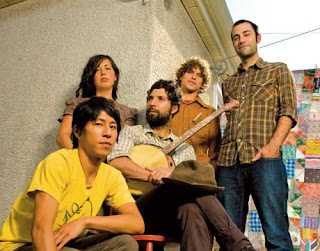 The Acorn frontman Rolf Klausener and I sit on the front porch of his Ottawa home sipping espresso as he answers my questions. Thirty minutes earlier an 5.0-magnitude earthquake shook the city. No one or thing was harmed, but the tremors roused some unsettling memories in Klausener of the last earthquake that shook Ottawa's foundations.
The Acorn frontman Rolf Klausener and I sit on the front porch of his Ottawa home sipping espresso as he answers my questions. Thirty minutes earlier an 5.0-magnitude earthquake shook the city. No one or thing was harmed, but the tremors roused some unsettling memories in Klausener of the last earthquake that shook Ottawa's foundations. The morning before driving to Montreal to put the finishing touches on No Ghost, The Acorn's first full-length release since 2007's Glory Hope Mountain, Klausener was shaken up by an unfortunate surprise. "I came down into the basement to start packing the studio and I hear, click-click, click-click, click-click. And then I see that the lamp that was on my desk had fallen onto our recording hard drive!"
This was last summer. Klausener had just recently loaded all of the tracking for not only all of No Ghost onto the hard drive, but also every recording he'd ever done, from The Acorn's debut The Pink Ghosts to their latest project and everything in between. "I freaked out! I unplugged the drive and put it in a freezer, apparently that's what you're supposed to do. I started calling around to some hard drive recovery places. It was 10am and we had to be in Montreal at noon."
Fortunately, The Acorn's engineer had the backup tracking for all of No Ghost, but tragically, the ghosts of the rest of The Acorn's discography were lost. "It breaks my heart," Klausener says. "It's been a year now and I'm over it. But still."
The majority of the instrumental tracking for No Ghost was put down over a three-week retreat to a cottage in Lac Charron, Quebec. Three busy years of touring and working on other projects after the release of Glory Hope Mountain meant the five members of The Acorn had had very little quality songwriting time together. "We were looking for a way to get away from the city and a way to spend some time together after having spent quite a lot of time on the road," Klausener remembers. "And we like recording things on our own anyways."
The cottage's cozy wooden interior and tranquil green surroundings were the perfect venue to foster the boys' musical and lyrical ingenuity. "Within the first few hours we were there, the riff for ‘Restoration' just got pulled out of the air. The next night is when we improvised the groundwork for ‘Misplaced'," Klausener remembers. "It was really magical."
The self-taught recording artist initiated The Acorn in 2002 when his other groups went on hiatus. "That summer I was really bored," Klausener explains, and so began fostering his own sound. The debut The Pink Ghosts began to materialize, and Klausener asked bandmates Howie Tsui, Jeff Debutte and Jeffrey Malecki to join the group.
In 2007, The Acorn released their ambitious and inspired opus Glory Hope Mountain. The group's sophomore project was sparked after Klausener inherited a family history book from his late father. He decided to interview his mother to learn the details of her early life and add to the book. "I knew she came from Honduras and I knew she had a hard life, but I didn't really know anything about her," Klausener recalls. "There was this flood and she was nine and she saved these kids. She ran away from home and nearly cut up her father with a machete." His lyrics reflect rather than repeat his mother's experiences, illustrating the story with vibrant metaphors and personification.
Klausener's lyrics have always come from an organic place, and on these latest recordings his words continue to flower from inspiration visible in the natural world. Whether his gaze is upturned toward the cosmos, fixed on the Gatineau River at sunset, or cast over his shoulder reflecting his own genealogy, his words personify "these little quiet moments" that mediated the songwriting process at the Lac Charron cottage last summer. A retreat from the sterile mechanics of the manufactured world and towards the warmth of organic inspiration and unofficial history, the feeling of the sun against skin, that's when The Acorn do their best work.
See them prove it this fall as they tour Canada, the United States and Europe for their No Ghost Cottage Tour.


